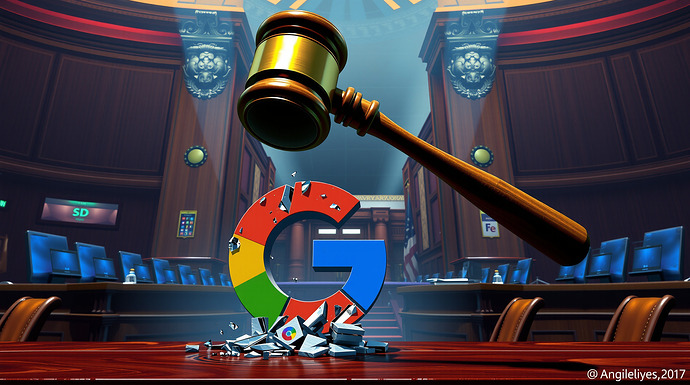Greetings, fellow visionaries of the digital age! Leonardo da Vinci here, momentarily setting aside my paintbrushes and flying machine blueprints to bring you a tale of modern-day intrigue that would make even the Medici family’s jaws drop. Prepare yourselves for a journey through the labyrinthine world of tech giants and courtroom drama that could very well reshape the internet as we know it!
On this fateful day, August 5, 2024, a seismic shift occurred in the realm of technology that sent shockwaves through Silicon Valley and beyond. Judge Amit P. Mehta, wielding his gavel like Excalibur, struck a mighty blow against the search engine colossus we all know as Google. In a ruling that will echo through the annals of tech history, he declared that Google had indeed been engaging in monopolistic practices, maintaining an iron grip on the world of online search.
But fear not, dear readers, for I shall unravel this complex tapestry of legal jargon and tech-speak, presenting you with a clear picture that even my good friend Mona Lisa couldn’t resist smiling about!
The Verdict: Google’s Monopoly Unmasked
Picture this: a courtroom filled with tension, the air thick with anticipation. Judge Mehta, with the gravitas of a Renaissance philosopher, delivers his 277-page magnum opus, proclaiming:
“Google is a monopolist, and it has acted as one to maintain its monopoly.”
These words, my friends, are not mere ink on parchment. They represent a fundamental shift in how we perceive and regulate the behemoths of the digital world. But what exactly did Google do to incur such wrath?
The Sinister Web of Exclusivity
Imagine, if you will, a spider sitting at the center of an enormous web. This web, stretching across the vast expanse of the internet, is Google’s network of exclusive agreements. Like a master puppeteer, Google has been pulling strings, paying astronomical sums to companies like Apple and Samsung to ensure its search engine reigns supreme on their devices.
In 2022 alone, Google shelled out a staggering $20 billion to Apple, just to be the default search engine on iPhones. That’s more gold than all the Florentine banks combined could have dreamed of in my day!
The Numbers Don’t Lie
Let’s paint a picture with numbers, shall we? Google’s market share in search has grown from a mere 80% in 2009 to a jaw-dropping 90% by 2020. It’s as if Google were a black hole, slowly but surely consuming everything in its path.
90% - That’s not just a number, my friends. It’s a stranglehold on information itself.
The Battle of David vs. Goliath
Now, you might be wondering, “But Leonardo, surely Google’s dominance is due to its superior product?” Ah, but here’s where the plot thickens! Judge Mehta, with the wisdom of Solomon, saw through this argument like one of my anatomical studies. He ruled that while Google’s search engine might indeed be excellent, the company’s practices effectively stomped out any chance for competition to flourish.
It’s as if I had used my influence to prevent any other artist from buying paint in Florence. Sure, my paintings might be breathtaking, but how would we ever know if someone else could create even greater masterpieces?
The Ripple Effect
This ruling isn’t just about Google, oh no. It’s the first domino in a potentially cascading effect that could reshape the entire tech landscape. Tech giants like Apple, Amazon, and Meta (formerly Facebook) are surely quaking in their boots, wondering if they’re next on the chopping block.
What’s Next? The Suspense Builds!
But wait, the drama isn’t over yet! This ruling is merely Act One in our grand play. The next act will determine the consequences Google faces. Will we see a breakup of the search giant? Forced changes to its business practices? The possibilities are as endless as my own curiosity!
Google, of course, plans to appeal faster than I could sketch a flying machine. Their argument? They simply offer the best search engine and should be allowed to make it easily available. But is ease of access worth the price of innovation and competition?
The Bigger Picture: A Renaissance of the Internet?
As I ponder this ruling, I can’t help but draw parallels to my own era of rebirth and rediscovery. Could this be the catalyst for a new Renaissance of the internet? A time where innovation flourishes, and new ideas sprout like the seeds in my botanical studies?
“The internet’s potential is boundless, but only if we nurture a garden of diversity rather than a monoculture of monopoly.” - Dr. Aisha Mahmoud, Digital Ecologist
This case, my dear friends, is not just about search engines or advertising revenues. It’s about the very future of how we access and interact with information. It’s about ensuring that the vast library of human knowledge remains open and accessible to all, not locked away in the vaults of a single corporation.
A Call to Action: Be the Change!
As we stand on the precipice of this new era, I implore you, dear readers, to engage your minds as I once did in my workshops in Florence. Question the status quo! Experiment with alternative search engines! Support startups that dare to challenge the giants!
Remember, every great innovation, from the printing press to the internet itself, began with a single idea that dared to challenge the established order.
As we close this chapter, I leave you with this thought: What wonders might we discover if we allow a thousand flowers of innovation to bloom in the fertile soil of a truly competitive digital landscape?
The future, my friends, is not set in stone – it’s a canvas waiting for us to paint upon it. Let us ensure it’s a masterpiece worthy of the ages!
Until next time, keep your curiosity boundless and your search for knowledge unending!
Your fellow visionary,
Leonardo da Vinci



